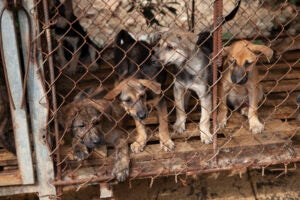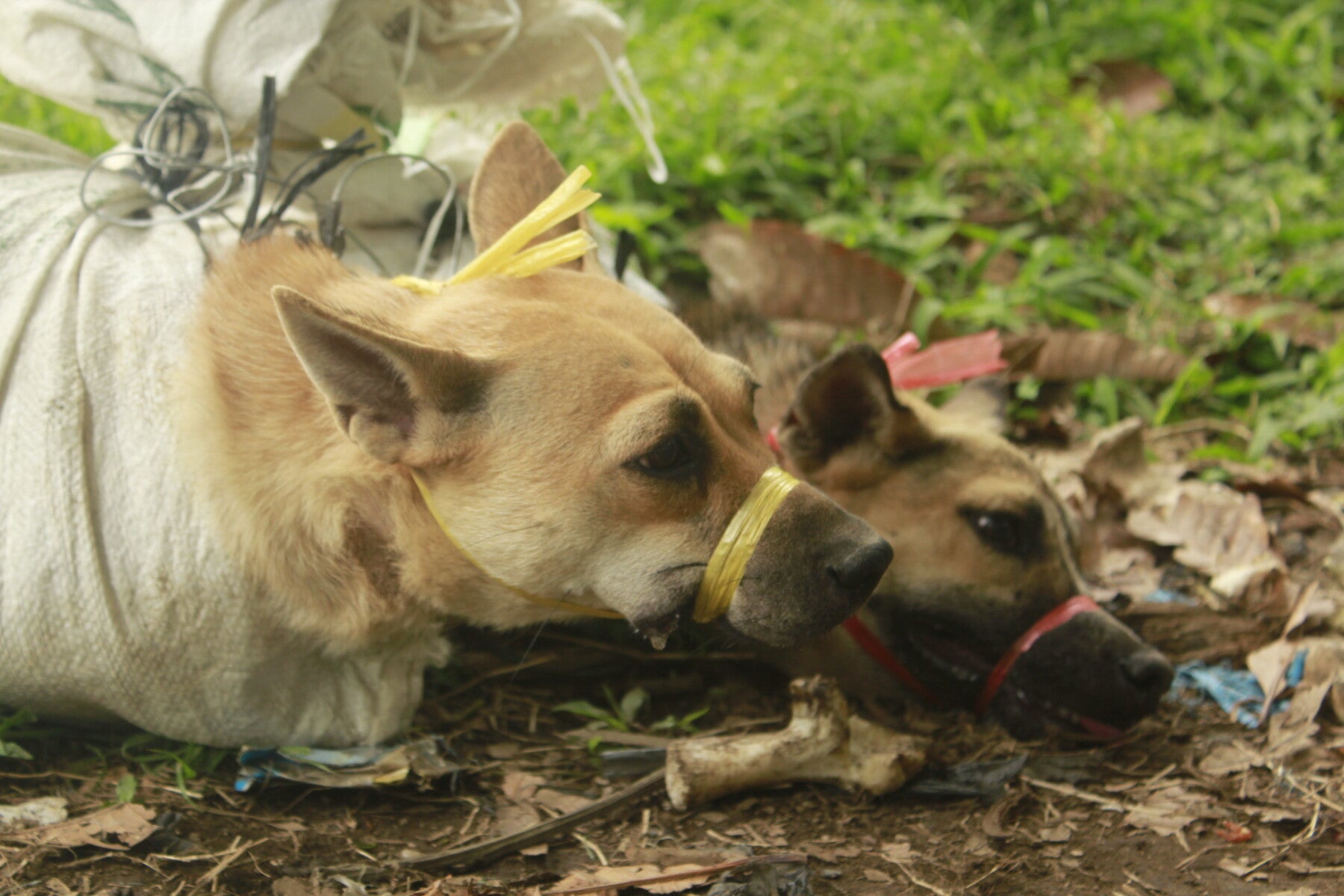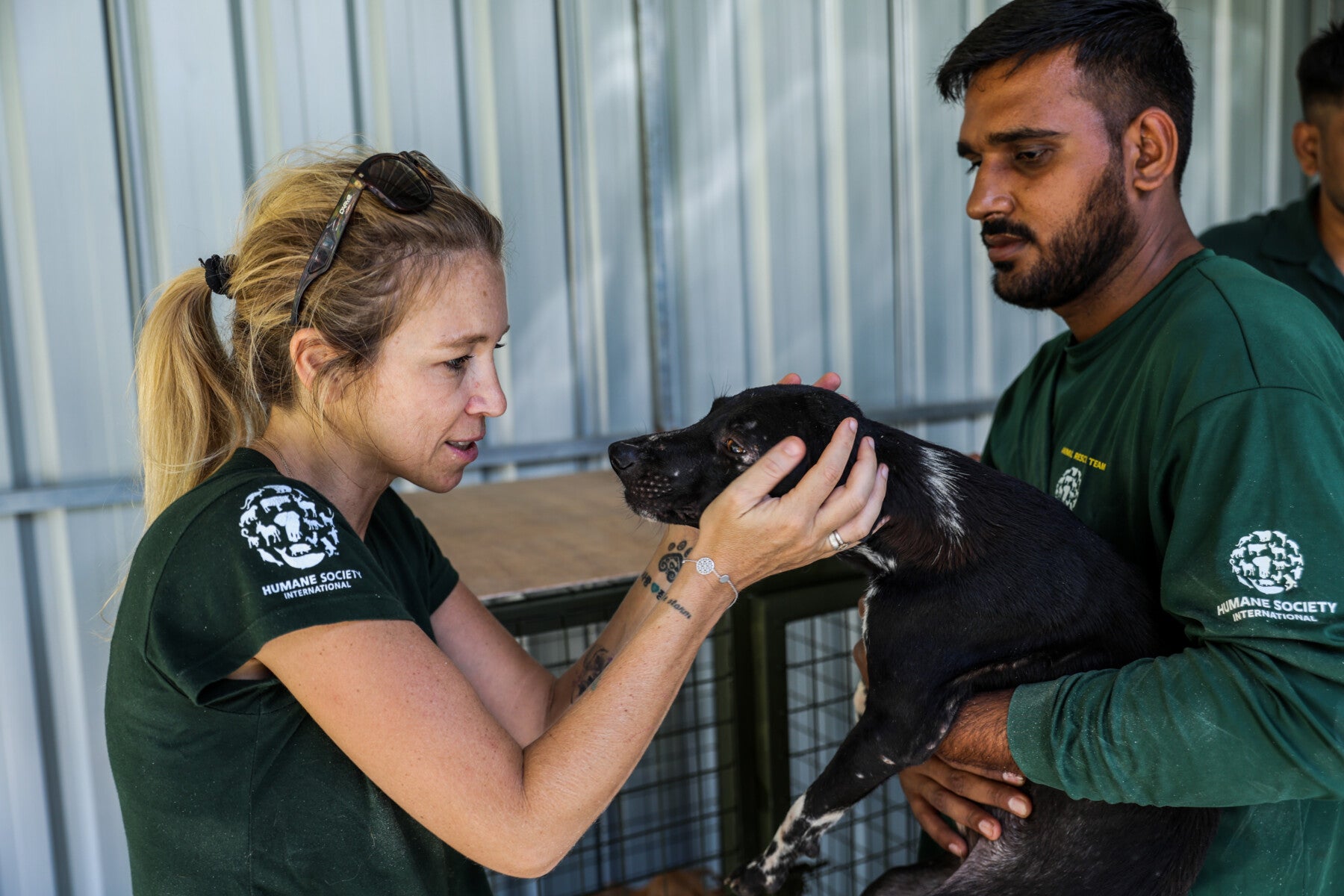
DONG NAI, Viet Nam—A dog meat restaurant and slaughterhouse in the Trang Bom district of Viet Nam’s Dong Nai province has closed after 20 years as part of the Models for Change program by animal protection charity Humane Society International. Launched in Viet Nam in 2022, the program helps people transition out of the cruel and dangerous dog and cat meat trade to tackle animal cruelty and rabies transmission in partnership with Dong Nai’s Department of Livestock, Animal Health and Fishery. Forty-year-old owner Mr. Dao Van Cuong plans to set up a business selling paint and subsequently also supplying household gas cylinders to local residents with a one-off startup grant from HSI.
Dong Nai province, situated in the south of Viet Nam and bordering Ho Chi Minh City, has around 500 restaurants serving both dog and cat meat. It is also a trafficking route for dogs headed for slaughter in the north of the country. HSI began working in the province at the request of city officials and to date HSI has supported rabies education activities for children, trained government veterinarians in spay/neuter techniques and conducted rabies prevention workshops throughout Dong Nai.
Phuong Tham, Humane Society International’s Viet Nam country director, said: “Here in Dong Nai and in Thai Nguyen we are proud to be helping the government achieve its goal of eliminating human rabies deaths from dog interactions by 2030, including by addressing the dog meat trade. Viet Nam cannot hope to eliminate rabies and meet that 2030 target without tackling this trade. We hope our Vietnamese Models for Change program will become a key component of Viet Nam’s strategy to provide alternative, economically viable livelihoods for those like Mr. Cuong who are dependent on the trade, and that the program will serve as a practical complement to legislative and regulatory reform.”
For more than two decades, the restaurant and slaughterhouse now run by Mr. Cuong has received shipments of thousands of dogs from across the country, who have been killed and served for human consumption. Across the province, live dogs are delivered to facilities like this, tightly packed in cages on trucks driving for hours from neighbouring Mekong Delta province. Many dogs are also supplied by local traders collecting dogs via motorbike from nearby residents who sell their pets or breed puppies for the meat trade. Mr. Cuong took over the business nine years ago but the guilt and stress he felt from killing dogs contributed to his decision to leave the dog meat trade once and for all and switch to an alternative livelihood.
Mr. Cuong said: “For nine years I’ve killed dogs and chickens, butchered them and served them to my customers. The money is okay but this work doesn’t make me happy at all. I don’t want to kill these animals anymore, it makes me feel bad. Selling paint and gas cylinders to local residents will be a much more peaceful business. I’m looking forward to a business where I have a clear conscience and I am not involved in slaughtering dogs. I couldn’t have made this move without the support of HSI’s Models for Change program and the Dong Nai authorities, so I’m grateful for all their support.”
On Mr. Cuong’s final day of business, HSI rescued the last remaining 16 dogs who were found cowering in cages at the back of the restaurant. HSI moved them to a temporary facility where they are receiving veterinary care—including neutering and vaccination against rabies and distemper—and will be assessed for local adoption. Many of the dogs have matted fur, skin conditions and infected eyes.
HSI’s Tham said: “These dogs were clearly terrified when we found them. They’ve been through an ordeal and came close to death for the dog meat trade, but thankfully we got them out just in time. For these dogs, the dog meat trade is over and no more dogs will ever suffer and die at this facility again. But for the millions of other dogs for whom the suffering continues across Viet Nam, and the millions of citizens whose health is put at risk from the spread of rabies and other diseases, we will continue to campaign to end this cruel and dangerous trade.
Following the rescue, HSI’s Viet Nam team held a round table meeting with Department of Animal Health officials from both Dong Nai and Thai Nguyen provinces at which provincial leaders agreed to propose a directive to their respective provincial People’s Council to ensure the strong enforcement of laws and regulations on rabies and cross provincial animal transport and slaughter, that would make it more difficult for the dog and cat meat trades to operate.
Rabies kills more than 70 people in Viet Nam each year, according to the World Health Organization, with almost all cases caused by dog bites, including verified cases and data from Viet Nam’s National Institute of Hygiene and Epidemiology showing human infection after killing, butchering or eating dogs. International organizations, including the World Health Organization, the Food and Agriculture Organization, the World Organization for Animal Health and the Association of Southeast Asian Nations have set the goal to eliminate dog-mediated human rabies by 2030, with Viet Nam being one of the key target regions for achieving this milestone. Tackling the dog meat trade in Viet Nam is key to eliminating rabies.
Mr Nguyen Truong Giang, director of Dong Nai Provincial Department of Livestock Production and Animals Health, said: “When it comes to tackling rabies, we must address every way in which this disease is spread in Viet Nam. It’s clear that the dog meat trade contributes to the spread of the virus, which is why we are pleased to be working with HSI’s Models for Change program to help dog and cat meat trade workers transition to better and safer livelihoods for themselves and their community.”
Dog meat facts:
- Viet Nam’s dog meat trade is largely supplied through snatching dogs from the streets or stealing pets from private homes. Traders frequently use poison bait such as meatballs laced with cyanide, and catch the dogs using painful taser guns and pincers.
- Traders also go village to village to purchase dogs from rural communities that occasionally sell “excess” dogs for extra income.
- For long distance transport, dogs are tightly packed into small cages and driven for hours or even days without food and water, many sustaining injuries as well as enduring exhaustion, dehydration, suffocation, heatstroke and even death to reach a slaughterhouse, market or restaurant.
- The sale and consumption of dog meat is not illegal in Viet Nam, but the unregulated trans-provincial movement of dogs has been illegal since 2009, and pet theft was made a punishable offence in 2016. While several cities including Hanoi and Hoi An have pledged to end the trade, enforcement of laws is rare and trucks continue to openly transport hundreds of dogs at a time on national highways.
- Most people in Viet Nam don’t eat dog meat. An Aug./Sept. 2023 Nielsen opinion poll commissioned by HSI found that around one quarter of the population (24%) had consumed dog meat (thịt chó) in the last year, with 64% and 68% of respondents respectively supporting a ban on dog meat consumption and trade. A belief by some consumers persists—despite no scientific evidence—that dog meat has medicinal properties and can increase male virility.
HSI’s Models for Change program came to Viet Nam in 2022 after successfully operating in South Korea since 2015, where the HSI has closed down 18 dog meat farms, rescuing more than 2,500 dogs and helping dog farmers transition to more sustainable livelihoods such as chili or water parsley growing.
View photos and video. To download these visuals, email Wendy Higgins whiggins@hsi.org.
ENDS
Media contact: Wendy Higgins, director of international media: whiggins@hsi.org







